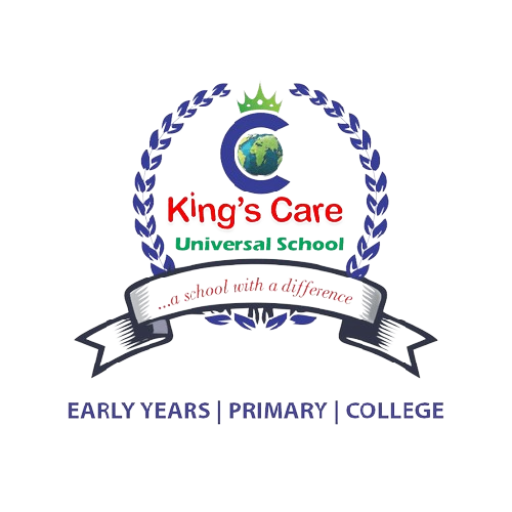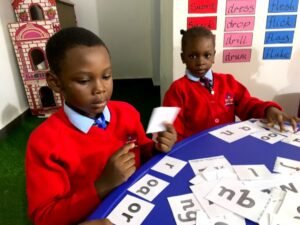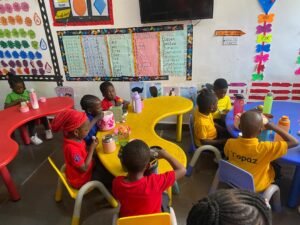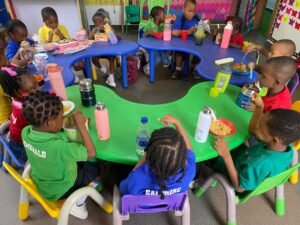
The impact of social media on Nigerian students is deeper than many parents realize. While platforms like WhatsApp, TikTok, Instagram, and Facebook have become an essential part of youth culture, their influence reaches far beyond entertainment. From academic performance to mental health and moral development, social media shapes how our children think, behave, and relate with the world around them.
At King’s Care Universal School (KCUS), we’re not only focused on quality classroom education — we also help parents and guardians navigate modern-day challenges like technology and screen time. As part of our ongoing commitment to raising well-rounded individuals, we believe understanding the impact of social media is vital to raising children who are confident, competent, and of good character.
Learn more about how we educate and support families at www.kingscareschool.org.
1. The Impact of Social Media on Academic Performance
Let’s start with the obvious — the impact of social media on learning habits. While social media can provide access to educational content, tutorials, and peer collaboration, it can also be a major source of distraction.
Recent research by ScienceDirect shows that students who spend more than three hours a day on social platforms report lower academic grades. In Nigeria, where mobile data is widely accessible and cheap, students can easily fall into a cycle of constant scrolling, reducing their focus and study time.
At KCUS, we teach students how to balance digital life with discipline. We integrate digital literacy into our programs, ensuring that technology becomes a tool — not a trap.
2. The Emotional and Mental Impact of Social Media
Another critical area is how social media affects emotions. The constant comparison, cyberbullying, and pressure to stay “liked” can damage a child’s self-esteem.
A recent article by PhundRight.com highlights how children exposed to social media too early may struggle with anxiety, loneliness, and sleep problems.
At King’s Care Universal School, we emphasize character development and emotional intelligence. Our counselors, teachers, and leadership programs provide students with the strength to handle external pressures with maturity and confidence.
3. The Social Impact of Social Media on Friendships and Relationships
While social media can help students maintain friendships and even meet like-minded peers, it can also interfere with healthy social skills. Many students report that they find it harder to hold conversations, resolve conflicts face-to-face, or concentrate in class because of the habit of multitasking between real life and their phone screens.
This aspect of the impact of social media is one parents often overlook — the slow erosion of interpersonal communication.
At KCUS, we train our students to engage in real-world interactions, debate, leadership groups, and public speaking, so they can thrive offline just as much as they do online.
4. Positive Uses of Social Media for Nigerian Students
Not everything about social media is negative. In fact, platforms like YouTube, LinkedIn, and even TikTok can serve as learning hubs. Some students use them to gain career exposure, watch math tutorials, or build skills like digital art, video editing, or writing.
The key, however, is moderation and mentorship.
At King’s Care, our educators guide students to safe and educational digital spaces. We also involve parents in digital discussions during PTA meetings and provide advice on healthy tech use at home.
5. Parenting Tips: Managing the Impact of Social Media at Home
Here are simple steps Nigerian parents can take to manage the impact of social media on their children:
Set screen time limits: Use apps like Google Family Link to monitor usage.
Create “no-phone” zones: For instance, no phones during meals or homework.
Encourage offline hobbies: Sports, art, reading, and board games help create balance.
Talk openly: Be involved in your child’s digital world without being controlling.
Lead by example: Model the kind of tech behavior you expect.
Remember, a child’s digital journey needs guidance — not total restriction.
6. What Makes KCUS Different?
At King’s Care Universal School, we don’t just educate — we empower. Our digital policies, moral instruction classes, and child development programs are designed with today’s challenges in mind. The impact of social media is something we take seriously, and we act before it becomes a problem.
We also provide:
Parent seminars on tech and parenting
Student workshops on digital safety
A balanced academic-digital curriculum
A safe and supervised school environment
Our goal is to raise children who are not only intelligent but disciplined, creative, and emotionally grounded.
Conclusion: Understanding and Controlling the Impact of Social Media
In today’s Nigeria, where over 50 million young people use mobile phones and social platforms, the conversation around the impact of social media cannot be ignored. What we do today as parents and educators will shape our children’s habits, minds, and futures.
At KCUS, we’re building that future — one child at a time. If you want your child to be part of a school that understands modern parenting challenges and offers real-world solutions, join the KCUS family today.
📍 Visit us:
King’s Care Avenue, off Victor Ayeye Street, FHA Estate Lugbe, Airport Road, Abuja
🌐 Enroll or learn more at:
👉 www.kingscareschool.org
Together, let’s raise a generation that’s smart, safe, and successful — online and offline.






